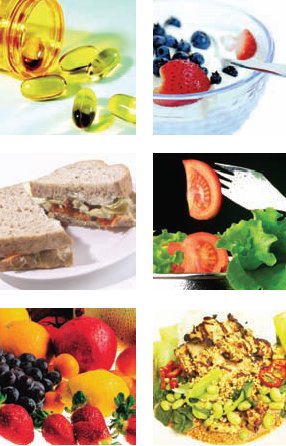Functional Foods. A Health Benefit Beyond Basic Nutrition.
What Are Functional Foods?
Functional Foods are foods or dietary components that may provide a health benefit beyond basic nutrition. You can take greater control of your health through the food choices you make, knowing that some foods can provide specific health benefits. Examples can include fruits and vegetables, whole grains, fortified or enhanced foods and beverages, and some dietary supplements. Biologically active components in functional foods may impart health benefits or desirable physiological effects. Functional attributes of many traditional foods are being discovered, while new food products are being developed with beneficial components.
Scientific Criteria for Functional Foods and Functional Components
Many academic, scientific, and regulatory organizations are considering ways to establish the scientific basis to support and further validate claims for functional components or the foods containing them. FDA regulates food products according to their intended use and the nature of claims made on the package. Five types of health-related statements or claims are allowed on food and dietary supplement labels:
• Nutrient content claims indicate the presence of a specific nutrient at a certain level.
• Structure and function claims describe the effect of dietary components on the normal structure or function of the body.
• Dietary guidance claims describe the health benefits of broad categories of foods.
• Qualified health claims convey a developing relationship between components in the diet and risk of disease, as reviewed by the FDA and supported by the weight of credible scientific evidence available.
• Health claims confirm a relationship between components in the diet and risk of disease or health condition, as approved by FDA and supported by significant scientific agreement.
A large body of credible scientific research is needed to confirm the benefits of any particular food or component. For functional foods to deliver their potential public health benefits, consumers must have a clear understanding of and a strong confidence in the scientific criteria that are used to document health statements and claims. The scientific community continues to increase its understanding of the potential for functional foods and their role in health.
Examples of Functional Components
Here is a list for Functional components, the foods that contain them and the nutritional benefit we gain from eating them and including them in our everyday diet plan.
| Class/Components | Source* | Potential Benefit |
| Carotenoids Beta-carotene | carrots, pumpkin, sweet potato, cantaloupe | neutralizes free radicals, which may damage cells; bolsters cellular antioxidant defenses; can be made into vitamin A in the body |
| Lutein, Zeaxanthin | kale, collards, spinach, corn, eggs, citrus | may contribute to maintenance of healthy vision |
| Lycopene | tomatoes and processed tomato products, watermelon, red/pink grapefruit | may contribute to maintenance of prostate health |
| Dietary (functional and total) Fiber Insoluble fiber | wheat bran, corn bran, fruit skins | may contribute to maintenance of a healthy digestive tract; may reduce the risk of some types of cancer |
| Beta glucan** | oat bran, oatmeal, oat flour, barley, rye | may reduce risk of coronary heart disease (CHD) |
| Soluble fiber** | psyllium seed husk, peas, beans, apples, citrus fruit | may reduce risk of CHD and some types of cancer |
| Whole grains** | cereal grains, whole wheat bread, oatmeal, brown rice | may reduce risk of CHD and some types of cancer; may contribute to maintenance of healthy blood glucose levels |
| Fatty Acids Monounsaturated fatty acids (MUFAs)** | tree nuts, olive oil, canola oil | may reduce risk of CHD |
| Polyunsaturated fatty acids (PUFAs) —Omega-3 fatty acids—ALA | walnuts, flax | may contribute to maintenance of heart health; may contribute to maintenance of mental and visual function |
| PUFAs—Omega-3 fatty acids—DHA/EPA** | salmon, tuna, marine, and other fish oils | may reduce risk of CHD; may contribute to maintenance of mental and visual function |
| Conjugated linoleic acid (CLA) | beef and lamb; some cheese | may contribute to maintenance of desirable body composition and healthy immune function |
| Flavonoids Anthocyanins—Cyanidin, Delphinidin, Malvidin | berries, cherries, red grapes | bolsters cellular antioxidant defenses; may contribute to maintenance of brain function |
| Flavanols—Catechins, Epicatechins, Epigallocatechin, Procyanidins | tea, cocoa, chocolate, apples, grapes | may contribute to maintenance of heart health |
| Flavanones—Hesperetin, Naringenin | citrus foods | neutralize free radicals, which may damage cells; bolster cellular antioxidant defenses |
| Flavonols—Quercetin, Kaempferol, Isorhamnetin, Myricetin | onions, apples, tea, broccoli | neutralize free radicals, which may damage cells; bolster cellular antioxidant defenses |
| Proanthocyanidins | cranberries, cocoa, apples, strawberries, grapes, wine, peanuts, cinnamon | may contribute to maintenance of urinary tract health and heart health |
| Isothiocyanates Sulforaphane | cauliflower, broccoli, broccoli sprouts, cabbage, kale, horseradish | may enhance detoxification of undesirable compounds; bolsters cellular antioxidant defenses |
| Minerals Calcium** | sardines, spinach, yogurt, low-fat dairy products, fortified foods and beverages | may reduce the risk of osteoporosis |
| Magnesium | spinach, pumpkin seeds, whole grain breads and cereals, halibut, brazil nuts | may contribute to maintenance of normal muscle and nerve function, healthy immune function, and bone health |
| Potassium** | potatoes, low-fat dairy products, whole grain breads and cereals, citrus juices, beans, bananas | may reduce the risk of high blood pressure and stroke, in combination with a low-sodium diet |
| Selenium | fish, red meat, grains, garlic, liver, eggs | neutralizes free radicals, which may damage cells; may contribute to healthy immune function |
| Phenolic Acids Caffeic acid, Ferulic acid | apples, pears, citrus fruits, some vegetables, coffee | may bolster cellular antioxidant defenses; may contribute to maintenance of healthy vision and heart health |
| Plant Stanols/Sterols Free Stanols/Sterols** | corn, soy, wheat, wood oils, fortified foods and beverages | may reduce risk of CHD |
| Stanol/Sterol esters** | fortified table spreads, stanol ester dietary supplements | may reduce risk of CHD |
| Polyols Sugar alcohols**—Xylitol, Sorbitol, Mannitol, Lactitol | some chewing gums and other food applications | may reduce risk of dental caries |
| Prebiotics Inulin, Fructo-oligosaccharides (FOS), Polydextrose | whole grains, onions, some fruits, garlic, honey, leeks, fortified foods and beverages | may improve gastrointestinal health; may improve calcium absorption |
| Probiotics Yeast, Lactobacilli, Bifidobacteria, and other specific strains of beneficial bacteria | certain yogurts and other cultured dairy and non-dairy applications | may improve gastrointestinal health and systemic immunity; benefits are strain-specific |
| Phytoestrogens Isoflavones—Daidzein, Genistein | soybeans and soy-based foods | may contribute to maintenance of bone health, healthy brain and immune function; for women, may contribute to maintenance of menopausal health |
| Lignans | flax, rye, some vegetables | may contribute to maintenance of heart health and healthy immune function |
| Soy Protein Soy Protein** | soybeans and soy-based foods | may reduce risk of CHD |
| Sulfides/Thiols Diallyl sulfide, Allyl methyl trisulfide | garlic, onions, leeks, scallions | may enhance detoxification of undesirable compounds; may contribute to maintenance of heart health and healthy immune function |
| Dithiolthiones | cruciferous vegetables | may enhance detoxification of undesirable compounds; may contribute to maintenance of healthy immune function |
| Vitamins | organ meats, milk, eggs, carrots, sweet potato, spinach | may contribute to maintenance of healthy vision, immune function, and bone health; may contribute to cell integrity |
| B1 (Thiamin) | lentils, peas, long-grain brown rice, brazil nuts | may contribute to maintenance of mental function; helps regulate metabolism |
| B2 (Riboflavin) | lean meats, eggs, green leafy vegetables | helps support cell growth; helps regulate metabolism |
| B3 (Niacin) | dairy products, poultry, fish, nuts, eggs | helps support cell growth; helps regulate metabolism |
| B5 (Pantothenic acid) | organ meats, lobster, soybeans, lentils | helps regulate metabolism and hormone synthesis |
| B6 (Pyridoxine) | beans, nuts, legumes, fish, meat, whole grains | may contribute to maintenance of healthy immune function; helps regulate metabolism |
| B9 (Folate)** | beans, legumes, citrus foods, green leafy vegetables, fortified breads and cereals | may reduce a woman’s risk of having a child with a brain or spinal cord defect |
| B12 (Cobalamin) | eggs, meat, poultry, milk | may contribute to maintenance of mental function; helps regulate metabolism and supports blood cell formation |
| Biotin | liver, salmon, dairy, eggs, oysters | helps regulate metabolism and hormone synthesis |
| C | guava, sweet red/green pepper, kiwi, citrus fruit, strawberries | neutralizes free radicals, which may damage cells; may contribute to maintenance of bone health and immune function |
| D | sunlight, fish, fortified foods and beverages such as milk, juices, and cereals | helps regulate calcium and phosphorus; helps contribute to bone health; may contribute to healthy immune function; helps support cell growth |
| E | sunflower seeds, almonds, hazelnuts, turnip greens | neutralizes free radicals, which may damage cells; may contribute to healthy immune function and maintenance of heart health |
* Examples are not an all-inclusive list.
** FDA approved health claim established for component.
*** Preformed vitamin A is found in foods that come from animals. Provitamin A carotenoids are found in many darkly colored fruits and vegetables and are a major source of vitamin A for vegetarians.
Nutrigenomics “Personalized Nutrition”
As scientific and technological advances develop in the field of health and nutrition, more and more focus has been directed toward the emerging field of nutrigenomics or “personalized nutrition.” The science of nutrigenomics involves the application of the human  genome to nutrition and personal health to provide individual dietary recommendations. By using an individual’s unique genetic makeup and nutritional requirements to tailor recommendations, consumers may one day have a greater ability to reduce their risk of disease.
genome to nutrition and personal health to provide individual dietary recommendations. By using an individual’s unique genetic makeup and nutritional requirements to tailor recommendations, consumers may one day have a greater ability to reduce their risk of disease.
Personalizing nutrition to an individual’s unique genetic makeup has the potential for positive health outcomes overall. Choosing an individualized approach, over a more traditional or general approach, to health and nutrition recommendations can provide consumers with the most appropriate and beneficial information for their specific nutritional needs. While personalized nutrition seems promising, research is still in the preliminary stages, and years may pass before accurate and effective recommendations can be made for individuals.
Functional foods are an important part of an overall healthful lifestyle that includes a balanced diet and physical activity. People should strive to consume a wide variety of foods, including the examples listed here. These examples are not “magic bullets.” The best advice is to include a variety of foods, which would provide many potentially beneficial components.




















